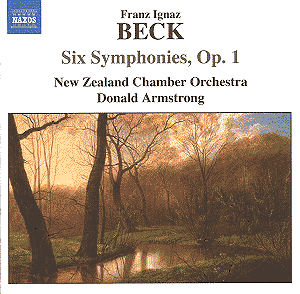Haydn may have been
called the "Father of the Symphony"
but the genre certainly preceded him
with composers such as Sammartini and
Johann Stamitz making significant early
contributions.
Franz Beck started
life in Mannheim and was taught by Stamitz
before spending time in Venice and Naples
then eventually settling in France.
He seems to have been an interesting
character, reputedly leaving Mannheim
after a duel and then eloping from Venice
with his bossís daughter. In the midst
of such intrigue the present symphonies
were published in Paris in 1758 and
were soon followed by three more sets.
Beck then appears to have lost interest
in the form. They were originally styled
as Overtures but, given their consistent
three-movement form have become known
as sinfonias.
Allan Badley states
in the booklet that Beckís symphonies
have "long been regarded as amongst
the most striking of the mid-18th
century". On the evidence of this
disc that seems a plausible claim but
Beck is hardly a well-known figure.
For example, he doesnít warrant an entry
in the current edition of the Oxford
Companion to Music. Recordings of
his music have so far been quite rare
although there is a Naxos disc in their
series "The 18th century
symphony" partly devoted to some
his later symphonies (8.553790). The
series also features two discs of symphonies
by Stamitz and it is not clear to me
why this new release isnít considered
to be part of it.
Each of the sinfonias
has a central andante framed by two
quick movements. Most of the finales
are marked Presto but the second
has a notable Vivace minuet.
The opening G minor symphony is perhaps
the most interesting and, in the extended
opening allegro, seems to point towards
Haydn. Within the set, there is plenty
of variety of mood and imaginative touches
abound making an hour in the company
of this disc pass by quickly.
The New Zealand Chamber
Orchestra was as unfamiliar to me as
Beck but it was also pleasing to make
their acquaintance. Formed in 1987 as
an offshoot of the New Zealand Symphony
Orchestra, they play on modern instruments
and are directed by their leader Donald
Armstrong. Their playing is lively and
they give these works a fairly light
touch. Orchestral numbers are not given
but I would guess about twenty string
players with harpsichord continuo. The
recording is well-balanced and was produced
by Stephen Managh, the founder of the
orchestra who, sadly, did not live to
see the disc issued.
This CD is recommended
to anyone interested in the origins
of the symphony and to collectors of
worthwhile little-known music. Please
Naxos can we have the rest of Beckís
symphonies?
Patrick C Waller











